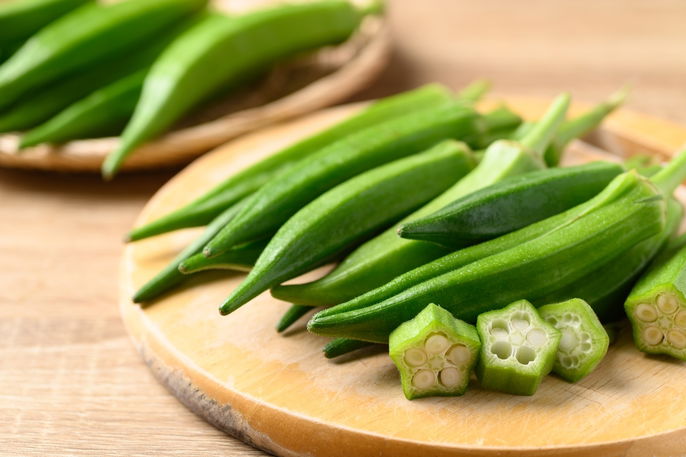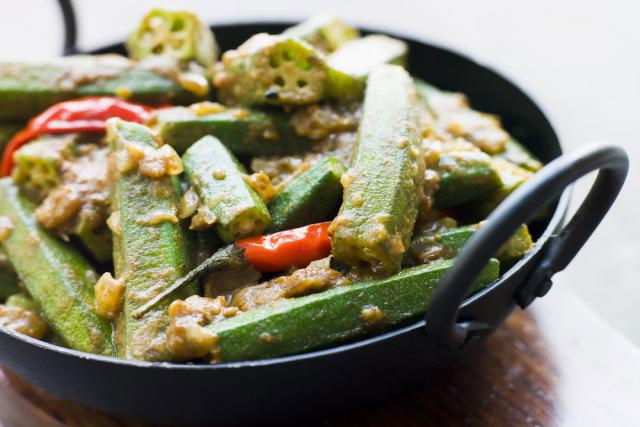The benefits of okra include supporting weight loss, regulating blood sugar, and improving digestion. This vegetable can be eaten raw or cooked in dishes like soups, salads, and stews.
Okra is rich in important nutrients like vitamin C, folate, and vitamin K. These vitamins play a key role in immunity, blood cell production, and bone health.
Another reason the benefits of okra stand out is its high fiber and antioxidant content. These compounds can help manage cholesterol, protect the skin and eyes, and lower the risk of chronic diseases.

List of benefits
The main benefits of okra are:
1. Promoting weight loss
Okra can aid in weight loss as it is rich in fiber, which means it takes longer to digest and keeps you fuller for longer. Okra is a low-calorie food, and is great option to include in weight loss diets.
However, in order to lose weight, okra should be incorporated into a low-calorie diet and an active lifestyle.
2. Regulating glucose levels
Okra can help to control blood glucose levels and prevent insulin resistance and diabetes. It is very high in fibers that slow down carbohydrate absorption.
3. Preventing premature aging
Okras are high in vitamin C with naturally antioxidant action that promotes collagen production of collagen. Collagen is a protein that provides the skin with firmness and elasticity, which can prevent premature aging. Check-out other vitamin C foods that you can incorporate into your diet.
Okra also contains excellent amounts of beta-carotene, a pigment that protects the skin from damage caused by UV ray exposure. This can also help to delay skin aging.
4. Treating constipation
Because it is high in fiber, okra stimulates natural bowel movements and can add bulk to the stool. This can help to treat constipation and make bowel movements more regular.
5. Maintaining eye health
Okra can promote eye health because it contains lutein and zeaxanthin, which are carotenoids that protect the eyes from UV and blue light damage.
These nutrients can also help to prevent the appearance of cataracts, diabetic retinopathy and age-related macular degeneration, which is a disease that can lead to vision loss.
6. Regulating cholesterol levels
Because it is high in fiber, okra can reduce the absorption of fat in the gut, which can help to regulate blood cholesterol levels. This can play a role in preventing cardiovascular diseases, such as a heart attack, atherosclerosis and high blood pressure.
Okra is also a great source of vitamin C and beta-carotene, which are nutrients that prevent the oxidation of fat cells. This can also help to control cholesterol and triglyceride levels in the blood.
7. Improving memory
Okra improves memory because it is rich in lutein, a carotenoid that preserves the functions of neurons, as well as protecting them against damage caused by free radicals.
Furthermore, the vitamin C present in okra is also essential for the production of dopamine, which is a neurotransmitter responsible for memory and learning.
8. Preventing anemia
Okra can also be consumed to prevent anemia, as it is high in vitamin C, a nutrient that promotes iron absorption from food. Therefore, this vegetable can help with the formation of hemoglobin, which is a component of red blood cells that is responsible for transporting oxygen throughout the body.
9. Maintaining bone health
Okra is rich in vitamin K, a nutrient that is important for the production of osteocalcin. This is a protein that is essential for the fixation of calcium on the bones, and normal levels are important for bone health and preventing osteoporosis.
10. Boosting immunity
Okra boosts immunity as it contains vitamin C, a nutrient that improves the functioning of defense cells. It can help to fight fungi, viruses and bacteria.
Can okra cause weight gain?
Okra does not cause weight gain, as it is low in carbohydrates and fat. It is also high in fiber, which can keep your appetite managed and reduce overeating.
Can okra water help to lower high glucose levels?
Although it is believed that okra water may lower blood glucose levels, there are no scientific studies that prove the benefits of this water for managing diabetes and glucose levels.
How to cook
Although there is no specific amount recommended of okra you should consume, you should aim to consume 2 to 3 servings of vegetables every day. This corresponds to about 160 to 240 g of vegetables per day.
Okra can be consumed raw or cooked in preparations such as stews, roasts, salads, stews, soups and juices.
How to get rid of okra gel
To remove okra gel or mucilage, you must wash the whole vegetable, dry it well with a clean cloth and then rub it with lemon juice. Then cut the ends of the okra and add to your preparations.
Healthy recipes

Check-out some healthy okra recipes below:
1. Sauteed okra
Ingredients:
- 300 g of okra
- 2 cloves of garlic
- 1 tablespoon of olive oil
- Salt and black pepper to taste
Directions:
Wash and dry the okra well. Cut off the ends of the okra, and then cut it lengthwise. Place a non-stick frying pan over medium heat, and add the olive oil and garlic. Add the okra, little by little, to the frying pan and season with salt and pepper. Sauté for 2 minutes on each side, then serve.
2. Okra juice
Ingredients:
- 100g of okra
- 200 ml of orange juice
- 200 ml of filtered or boiled water
- Honey to taste
Directions:
Wash well, remove the ends and cut the okra into slices. Place all ingredients in the blender and blend until smooth. Serve immediately.
3. Chicken with okra
Ingredients:
- 1 whole chicken
- 200 g of okra
- 2 lemons
- 1 chopped onion
- 1 chopped tomato
- 5 chopped garlic cloves
- 1 chopped pepper
- 1/4 cup of olive oil
- 1 teaspoon of cumin powder
- Salt, black pepper and green scent to taste
Directions:
Season the chicken with onion, garlic, peppers and tomatoes and set aside. In a pan, sauté the chicken over medium heat and once golden, add a little water to cook.
Add salt, pepper and green chillies to season. Cut the okra into cubes and after 20 minutes of cooking the chicken, add them to the pan and cook for another 20 minutes. Remove from heat and serve while still hot.
4. Raw okra salad
Ingredients:
- 200 g of okra
- 1 medium onion, sliced
- 1 medium tomato, chopped
- 3 tablespoons of vinegar
- 3 tablespoons of olive oil
- Juice of ½ lemon
- Salt and coriander to taste
Directions:
Wash and dry the okra, and cut off the ends. Cut the okra into approximately 2 cm slices. Place all the ingredients in a bowl, mix with a spoon, and then serve.
Nutritional information
The following table outlines the nutritional information for 100 g of raw and cooked okra:
To obtain all the benefits from consuming okra, it is also important to maintain a healthy and varied diet and practice physical activity regularly.






























